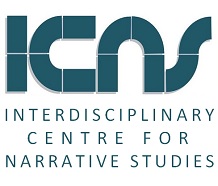Mock Conference Panel: Aspects of Narrative

Monday 26 March 2018, 4.00PM to 6.00 pm
This ICNS event is a conference-panel style presentation of three papers exploring narrative topics. Each 20-minute paper will be followed by an opportunity for questions and discussion. The papers and speakers are as follows:
"Transmedial Narratology for Computational Media"
Hanna Roine (Helsinki)
While the current developments in transmedial narratology have called our attention to phenomena such as narrative representation across media, the profound effect of the computer on media has been neglected. Contemporary media is converging not only in the use of multiple media platforms to create narrative experiences, but also in the way all artistic media is being incorporated by the computer, acquiring its properties in the process. In order to gain a better understanding of this change and its effects on storytelling, this presentation extends the scope of narrative theory towards the machines of digital media and presents three concepts – database, procedurality, and reciprocity – for the study of narrative in computational environments.
"Timely Coincidences: The Representation of Time and Chance in Paul Auster’s Moon Palace"
Yu-Hua Yen (York)
In Paul Auster’s Moon Palace (1989), the narrator Fogg says: “by abandoning myself to the chaos of the world, the world might ultimately reveal some secret harmony to me, some form or pattern that would help me to penetrate myself” (78). Fogg believes there is order despite the apparent contingency of experience. Recalling the series of unexpected events in his early twenties that led him to the brink of death and then to being miraculously saved, Fogg produces a narrative sequence in which chance happenings are regarded as fateful and predetermined.
The representation of chance as simultaneously accidental and destined reflects the dual perspective and double temporality of autobiographical narration—the protagonist Fogg is ignorant of his future, but the narrator Fogg knows what will happen. Words and phrases such as “oracle”, “miracle”, or “premonitory truth” create an atmosphere of suspense and force the reader to suspend their judgement. Fogg controls what to reveal and when. This distribution of information across narration time operates what Mark Currie calls the “crossovers between time and truth”—what is not yet known is equated with what has not yet been told, and what has been told is taken as what is “true” (The Unexpected 137).
This paper analyses the representation of contingency in Moon Palace and the ethical import of its rhetoric. The act of narrative transforms chaos into order and thereby provides the means to establish a continuous and meaningful sense of self. But the artifice of narrative also undermines the authenticity upheld by the project of autobiography—it gives a certain freedom and power to decide what is “true”. Moon Palace critiques the self-mythologizing tendency in self-representation, and this paper explores how it stages the tension between autobiography as an aesthetic act and an ethical act.
"Unnatural Alice: Or, What Is Unnatural about Nonsense and What Is Nonsensical about the Unnatural"
Francesca Arnavas (York)
Grounding my approach on articles and studies by Alber, Iversen, Nielsen and Richardson among the others, as well as the critical perspective expressed by Fludernik in her “How Natural is ‘Unnatural Narratology’?”, I inquire into the controversial idea of the unnatural, by examining the parallelism between the concept of unnatural narratives and that of nonsense (specifically in relation to Lewis Carroll’s Alice books, but also with a broader significance). Firstly, I would like to justify properly this connection between nonsense texts and unnatural fiction, by pointing out their common features and their differences, and, in doing so, highlight possible unresolved issues with the concept of the unnatural (mainly the rather rigid dichotomy between the mimetic and the antimimetic, with all its theoretical consequences). Secondly, I take the idea of the fantastic (as outlined by Prickett) in the Alice books as a means to relate nonsense and unnatural in a more nuanced and complex fashion. My reading of the narrative tissue of the Alice books shows that, as Fludernik has suggested, the opposition unnatural-natural should be replaced by some other term, to “signify a third space or position from which to analyse the negotiations between the mimetic and its various contraventions. (Perhaps impossible or phantasmal (…) could work”). Carroll’s Alice books, considered with respect to their storyworlds, their characters’ minds and their narrative techniques, emphasize the arbitrariness of fixed boundaries, through their inclination for “re-patterning”, “dislocating” and rearranging oppositions (Stewart).
Location: Seminar Room BS/008, Berrick Saul Building, University of York Heslington West Campus
